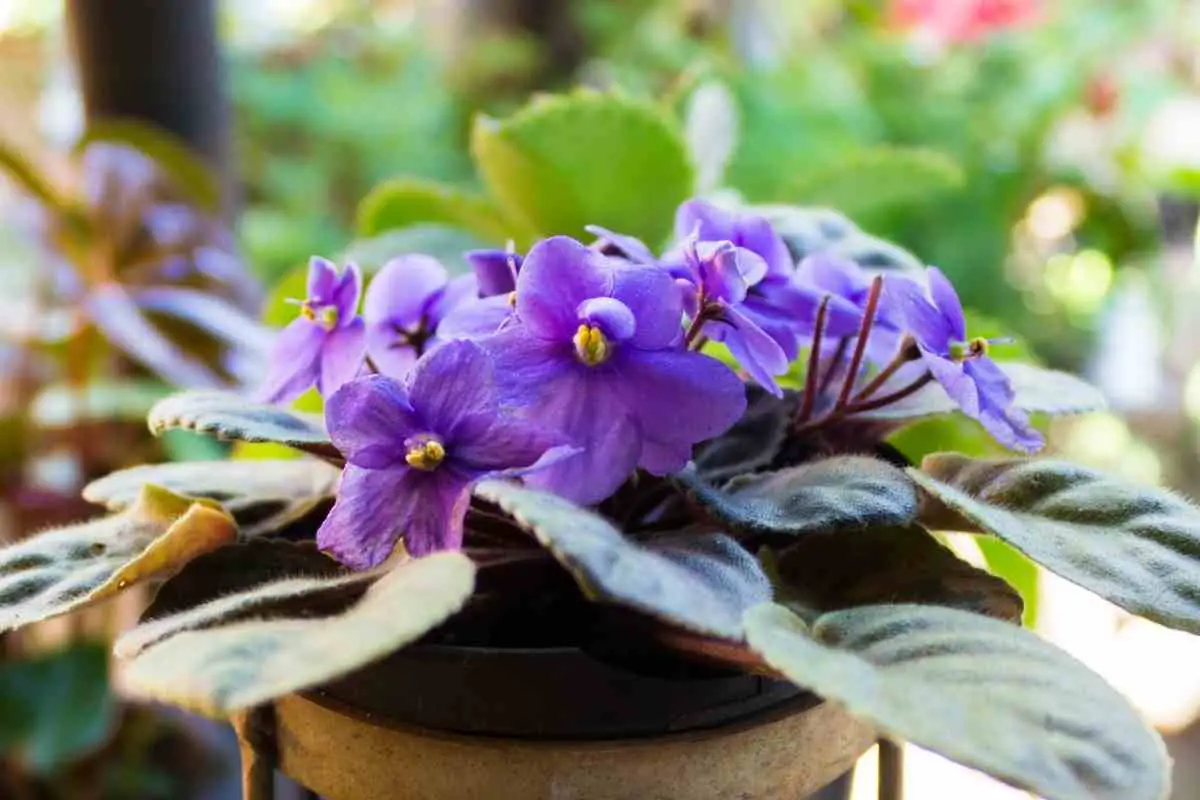African violets are one of the best home plants you can get.
Therefore, it is essential for you to provide them with the care they need. Food, water, and nutrients are very crucial in their growth process.
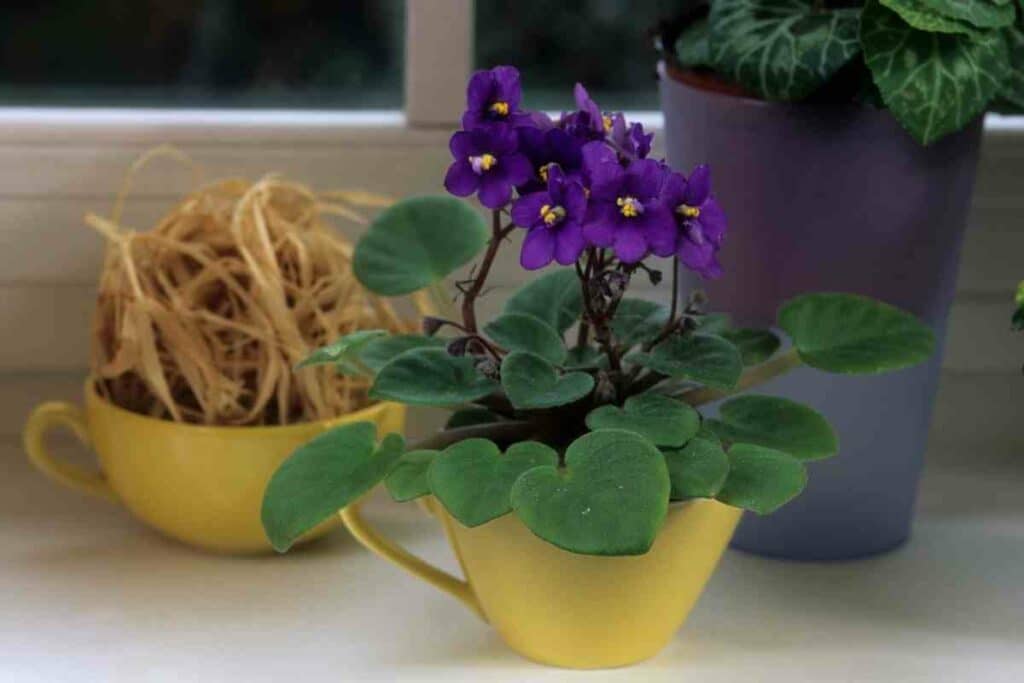
Also, remember plants that grow in the house depend more on the grower for sufficient nutrients, unlike those grown outdoors.
It is important to know what fertilizer to use and how to feed it to the plant because not all fertilizers work the same.
Keep In Mind – African violets in particular need water-soluble fertilizer and the right ratio of nutrients to suit the plant’s needs.
Do I need to use fertilizers on my African Violets?
African violet requires very little maintenance.
For a good blossom they need:
- water
- heat
- and good exposure
Even though they keep producing their flowers throughout the year, you still have to feed them with extra nutrients for healthy bloom.
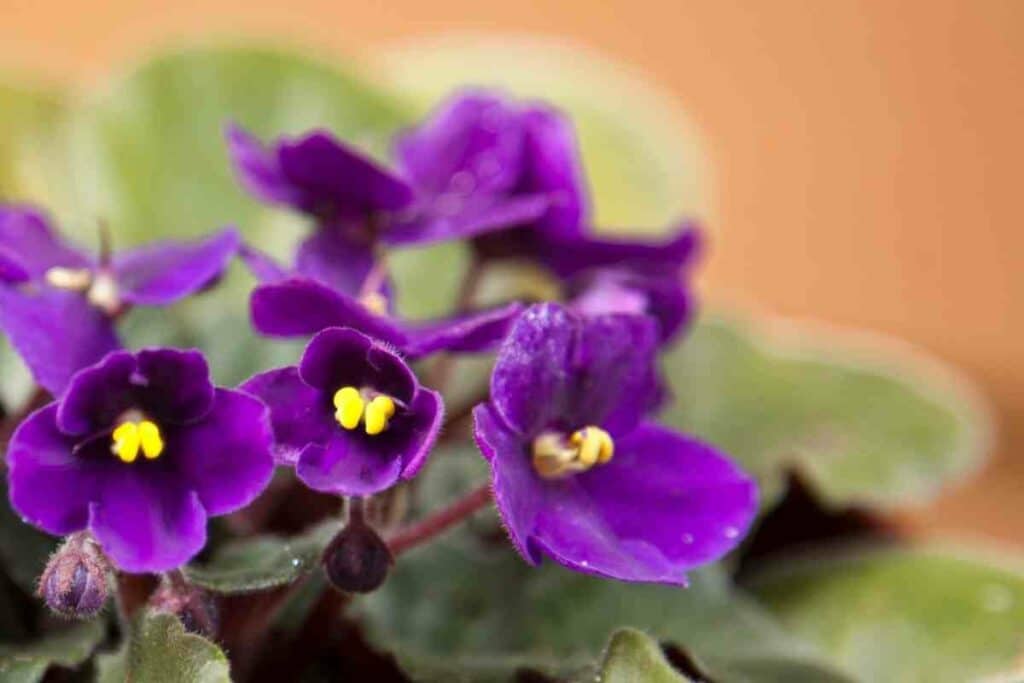
Most plants including African violets require soluble vitamins and micro and macronutrients.
The fertilizers they require must be soluble in a ratio that best suits their needs.
You should use a balanced fertilizer combined with the main nutrients that the plant needs.
This is usually:
- phosphorous
- potassium
- nitrogen
- and some minerals
Nitrogen is important for the growth of stems and leaves, phosphorous is responsible for healthy roots and flowering, while potassium is useful for the movement and accretion of carbohydrates to the African violet plant.
What are the best fertilizers for African violets?
African violets need a certain percentage of nutrients in the fertilizers.
The recommended ratio of nitrogen, phosphorous, and potassium is 14-12-14.
Several best fertilizers are effective for African violets, and I will list you some of the best in the market.
Fertilizers are manufactured in different types that as slow and quick-release liquid and solid fertilizers.
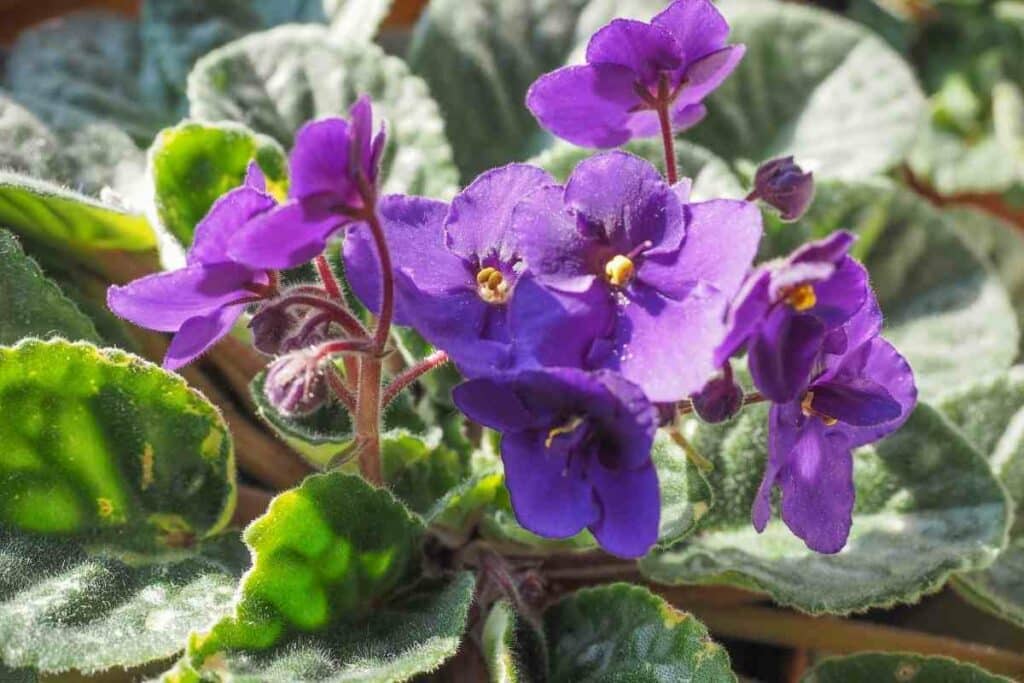
The slow-release do the work by nourishing the potting soil as soon as they are applied and providing the plants with nutrients for about two months.
On the other hand, quick-release fertilizers are usually in powder and liquid form, and they need to be diluted with water before watering the soil.
They release their nutrients instantly to the plants once administered and thus work best when the plants need a little push to grow optimally.
These fertilizers are used more often through the growing seasons than the slow release.
4 Best Fertilizers For African Violets
1. EZ Gro African Violet Food 10-30-20
Key Features
- It contains phosphorus
- Comes with a Micronutrient package
- It has an NPK ratio of 10-30-20
This is a free urea fertilizer with an NPK ratio of 10-30-20.
Therefore, it is great at providing nutrients that support healthy foliage and strong leaf formation while protecting the plants from ammonium toxicity.
The fertilizer is also known for promoting stocky stems, vigorous root and bud growth, and brilliant flowers.
Additionally, it is combined with a Micronutrient Package to provide the best nourishment for huge, gorgeous blooms.
What’s great about this concentrated liquid fertilizer is that it is fast-acting. It immediately nourishes your African violet plants, promoting growth and greening.
Pros
- Urea-free, meaning it protects important microbes
- Great for blooming flowers
Cons
- The measuring cup is not built to last for long
Additionally, its high phosphorus content promotes flowering making your home brighter than ever.
As recommended, feed the plants with a measuring cup every 7-14 days during the growth period.
2. Espoma Organic Violet Plant Food
Key Features
- Sold in two packs
- It is in liquid form
- Contains non-plant food ingredients
This fertilizer is specially designed for African violet plants but can also do well with other plants such as orchids. It is a water-soluble fertilizer with organic food.
Impressively, it contains other beneficial microbes and major plant nutrients needed to keep the plant healthy during its growth process.
The main ingredients are hydrolyzed fish, soy protein, hydrolyzed poultry manure, bone meal, and potassium sulfate.
You should use the fertilizer for two to four weeks by mixing it with water and pouring it directly into the pot’s soil without direct contact with the plant.
The fertilizer comes with a measuring cup for easy use. During use, measure the dosage by tilting the bottle upside down while the cap is closed.
Pros
- Easy to use
- It is organic
Cons
- Can be harmful to plants when used excess
Tilt it back upright, open the lid, and the dosage will remain at the cap in the intended amount.
However, it would be best if you always remembered to follow the directions on the label.
3. Jack Classic Special African Violet Fertilizer
Key Features
- The recommended usage ratio is 1/8 tsp per gallon of water
- Contains Urea Nitrogen
- It is a slow release fertilizer
This is a slow-release fertilizer where you dilute it with water and pour it directly on the soil. The reason this fertilizer is great for foliage growth is that it contains urea nitrogen.
In particular, Ammoniacal Nitrogen – 3.39%; Nitrate Nitrogen – 0.94%; Urea Nitrogen – 7.67%.
However, it is important to note that African violets are somewhat sensitive to fertilizers that use urea as a nitrogen source.
As such avoid over-fertilization and follow the manufacturer’s guidelines.
This high level of urea nitrogen is great for bloom growth. Apart from that the nutrient also aids in photosynthesis and leaf development.
Since it is slow-acting you need to allow the nutrients to be released gradually to the roots for up to 4 months of robust growth.
This saves time for you and, at the same time, provides the plants with enough nutrients for strong and vibrant leaves and flowers.
Pros
- Can be used both indoor and outdoor plants
- One tub can last for six months
- Contains micronutrients
Cons
- If you over-fertilize, the African violet will have more leaves and fewer flowers.
- African Violets are sensitive to urea
An enhanced micronutrient package delivers ideal nourishment for strong roots and green leaves.
When used as instructed, it has the highest safety factor to avoid burning. For easy but also precise application, a free measuring spoon is included.
4. Earth Pods premium African violet food
Key Features
- It contains 100 capsules which are Natural plant food spikes
- It is a slow-release fertilizer
- It does not contain urea
If you are environmentally conscious, this is the product for you. The fertilizer is natural and very eco-friendly unlike most modern fertilizers.
Additionally, it is safer for pets and children than the other African violet fertilizers.
Also, if you hate the smell of the other fertilizers, this is the perfect solution for you.
To use the fertilizer, you will need to dig in the slow-release capsules a few inches in the potting soil, water normally, and wait for the fertilizer to do its job.
The capsules have organic root fungi, humic acids, and bacteria.
The fertilizer also contains micro and macronutrients for the healthy growth of foliage and flowers.
Pros
- Effective and simple to use
- Easy to store
- Environmentally friendly.
- It does not produce any stinky smell
- It is versatile and can be used for other plants such as calatheas
Cons
- Takes time to release nutrients
- It is expensive
Pop the capsules after every two weeks for optimum results. After a short period, the roots will thrive properly, and the flowers will show good attractive colors.
The earth pod fertilizer is slightly more expensive, but the reviews and results speak for themselves.
How And When Do I Feed My African Violet Plants With Fertilizers?
Before you handle any fertilizer, the first thing to do is ensure you read the instructions.
The fertilizers come with a label to guide you with the proper dosage to avoid over-fertilizing the plants.
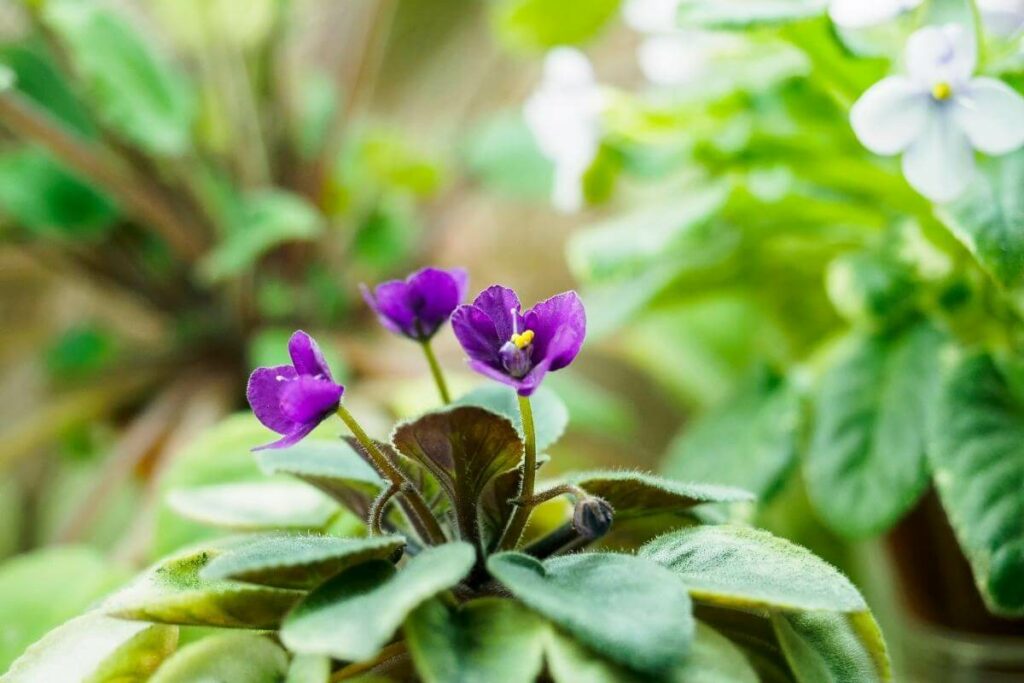
Here are the main points:
- For most fertilizers the ideal dosage is usually each four to six weeks during their growing period. However, this might change depending on the product.
- Spring is the best season to add fertilizers to the plants. This is because this is the period where plants experience leafy growth and production of flowers. Adding fertilizer in early spring will further encourage this growth.
- Since some fertilizers are water soluble, you should also be aware of how many times you should water your plants. The African violet plants are adapted to periodic rainfall, meaning they don’t need a lot of water to thrive.
- The best way to tell when to water the plants is to feel the soil at the plant base; if it’s dry, the plant is ready for watering. Don’t overwater the plants since it could result in yellowing of leaves and wilting.
- Lastly, it is crucial to observe basic safety precautions when dealing with fertilizers. For instance, wear gloves while working. Also, store the fertilizers away from children and pets.
Fertilizers should be kept in a dark, cool and dry area.
Don’t use household to fertilize your plants, instead use designated containers.

Additionally, try to be accurate with measurements to avoid draining the excess diluted fertilizers in sinks or sewage systems.
How do I know I have over fertilized my plants?
- Development of dark brown spots at the tip or center of the leaves.
- The leaves start to form cracks, wilt, or turn brittle.
- Development of an orange-colored crystallization on the leaf hairs.
- Formation of crusty white salt around the pot. This means there are excess fertilizer salts.
Final Thoughts
Unlike outdoor plants, indoor plants require a supply of nutrients by the grower to thrive and bloom.
This makes the use of fertilizers crucial for indoor plants such as African violets.
As mentioned above, some commercial fertilizers have a balanced supply of nutrients made specifically for this plants.
While it might be tempting, avoid over-fertilizing your plants. Always read the directions in the fertilizer’s label before using them.
Also Helpful
- Philodendron Care, Varieties, And Aesthetic Home Arrangements
- Best House Plants for Low Light – Thriving Indoors with Minimal Sunlight
- 15 Air-Purifying Houseplants That Release The Most Oxygen
- Purple Houseplants: Your Guide to Dramatic Indoor Beauty
- Philodendron Moonlight Vs. Golden Goddess
- How to Revive Your Rubber Plant: 6 Tips to Help Your Rubber Tree Thrive Again
